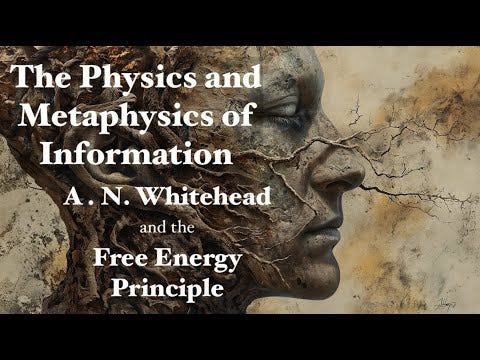Tim and I met for another thought jam to explore the interplay between contemporary physics, information theory, biology, and Whitehead's process philosophy. We got into the ontology of abstraction and in the end found ourselves ruminating on the nature of reality in an increasingly technologically mediated world. Our conversation unveiled a shared concern: as physics has become untethered from reality due to a rejection of metaphysics, there is an urgent need to reestablish a realistic metaphysical background for modern scientific inquiries. This undertaking is vast, as we are aspiring to reconcile the constructivist impulses of pragmatist philosophy of science with a realist ontology that roots experience and information deep in nature.
We take seriously Whitehead’s idea that abstraction is not merely a human linguistic operation but reflects nature's mode of interaction. Human thought, in abstracting, merely conforms to nature's inherent tendencies.
We also discussed the controversies surrounding comparisons between the Free Energy Principle and the related Autopoietic and Enactive paradigms (for a taste, see this paper by Di Paolo, Thompson, and Beer).
I played with trying to map some elements of Friston et al.’s FEP model to Whitehead’s concepts of concrescence, actual occasions, eternal objects, societies, and propositions.
We consider the role of God's primordial nature in providing an aesthetic ground for non-statistical judgments of probability by introducing feelings of relevance and adjacent possibility into the experience of every creature in the cosmos.
Tim expresses a desire to at least attempt to simplify Whitehead's intricate system by making a leaner set of fundamental posits. He suggests that a constructivist ontology could provide a foundation for understanding how generalized forms emerge from the cosmic history, thus making Whitehead’s category of eternal objects unnecessary.
I’m skeptical this will work, but I’m definitely willing to consider Tim’s arguments! While I would affirm that all enduring form in the cosmos is historically emergent, the categories of actuality and eternality cannot themselves be so.For my take on why a coherent metaphysics can’t do without the function of Whitehead’s eternal objects, see this paper “Standing Firm in the Flux: On Whitehead’s Eternal Objects” (2023). Perhaps there are other ways of fulfilling the function, but we should at least be clear on the need for such a category.



